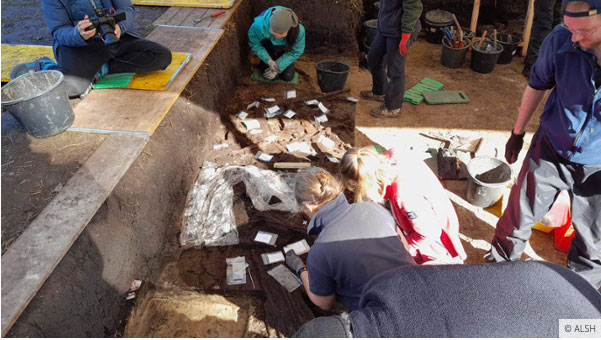 SCHLESWIG-HOLSTEIN, GERMANY—Live Science reports that prehistoric campsites and a human burial have been uncovered at the Duvensee bog in northern Germany. Hunter-gatherers are thought to have come to what were lakeside camps and camps on islands in the lake between 15,000 and 5,000 years ago to fish and roast hazelnuts. “In the beginning, we have only small hazelnut roasting hearths, and in the later sites, they become much bigger,” explained Harald Lübke of the Center for Baltic and Scandinavian Archaeology. He thinks hazelnut trees may have spread throughout the area as the environment changed. Bone points uncovered along the lakeside campsites are thought to have been used to spear fish. Sitting mats made of bark have also been found in the bog’s damp soil, along with pieces of worked flint and hearths. Cremated human bone discovered on the lakeside has been dated to 10,500 years ago. It is not clear if the bones had been wrapped in hide or bark before they were buried. Lübke concluded that the campsites and the artifacts recovered from the Duvensee bog are similar to those found at Star Carr in northern England. Up until about 8,000 years ago, he explained, the two regions were connected by a now-submerged area called Doggerland, so the communities may have shared technologies. For more on the archaeology of the North Sea, go to "Letter from Doggerland: Mapping a Vanished Landscape."
SCHLESWIG-HOLSTEIN, GERMANY—Live Science reports that prehistoric campsites and a human burial have been uncovered at the Duvensee bog in northern Germany. Hunter-gatherers are thought to have come to what were lakeside camps and camps on islands in the lake between 15,000 and 5,000 years ago to fish and roast hazelnuts. “In the beginning, we have only small hazelnut roasting hearths, and in the later sites, they become much bigger,” explained Harald Lübke of the Center for Baltic and Scandinavian Archaeology. He thinks hazelnut trees may have spread throughout the area as the environment changed. Bone points uncovered along the lakeside campsites are thought to have been used to spear fish. Sitting mats made of bark have also been found in the bog’s damp soil, along with pieces of worked flint and hearths. Cremated human bone discovered on the lakeside has been dated to 10,500 years ago. It is not clear if the bones had been wrapped in hide or bark before they were buried. Lübke concluded that the campsites and the artifacts recovered from the Duvensee bog are similar to those found at Star Carr in northern England. Up until about 8,000 years ago, he explained, the two regions were connected by a now-submerged area called Doggerland, so the communities may have shared technologies. For more on the archaeology of the North Sea, go to "Letter from Doggerland: Mapping a Vanished Landscape."
Human Burial Uncovered at Mesolithic Campsite in Germany
